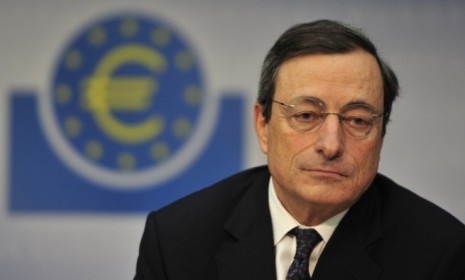5 ways to save Europe
Europe is in crisis, and the fallout from its fast-approaching financial meltdown would hurt the U.S., too. Is a Fed bailout the answer?

A free daily email with the biggest news stories of the day – and the best features from TheWeek.com
You are now subscribed
Your newsletter sign-up was successful
Debt-addled Europe is leading the world toward a devastating financial meltdown that could be much worse than the frightening 2008 financial crisis, says The Economist. Until recently, most observers presumed that European leaders would deal with their debt crisis and do whatever it took to save the continent's common currency, the euro, "because the consequences of the euro's destruction are so catastrophic that no sensible policymaker could stand by and let it happen." But august financial analysts are now giving Europe about a week to get its house in order — and many don't sound too hopeful. What could Europe do to prevent its looming catastrophe? Here, five ideas:
1. Issue eurobonds
Each eurozone country issues its own sovereign debt, and the crisis is spreading because worried investors are now demanding punishingly high interest rates from solvent nations like Italy. Meanwhile, debt-plagued Greece, Portugal, and Ireland are already shut out of the market, and even AAA-rated Germany is seeing its borrowing costs rise. To stop this death spiral, all 17 eurozone nations could issue joint eurobonds, using the stronger nations' creditworthiness to lower the borrowing rates for weaker nations to a sustainable level. But because that would raise its own rates, "Germany has been fiercely resisting the eurobond proposal," says Don Melvin for the AP. And this won't happen without Germany's blessing.
The Week
Escape your echo chamber. Get the facts behind the news, plus analysis from multiple perspectives.

Sign up for The Week's Free Newsletters
From our morning news briefing to a weekly Good News Newsletter, get the best of The Week delivered directly to your inbox.
From our morning news briefing to a weekly Good News Newsletter, get the best of The Week delivered directly to your inbox.
2. Have the European Central Bank print money
The really frustrating thing about Europe's crisis "is that this is that rarest of problems — one that you really can solve just by throwing money at it," says James Surowiecki in The New Yorker. If the European Central Bank assured investors that it would backstop Italy and Spain's debt, buying as many bonds as needed, "worries about default would recede and interest rates would fall." That injecting of liquidity is what central banks are supposed to do — act as "lender of last resort during financial crises." But the inflation-obsessed ECB won't act, essentially "protecting the euro right out of existence."
3. Have the Federal Reserve print euros
"If Europe is contracting, or if Europe is having difficulties, then it's much more difficult for us to create good jobs here at home," President Obama said Monday, underscoring U.S. fears of financial contagion. That's why a proposal for the U.S. Federal Reserve to fill the ECB void, stepping in as "a global lender of last resort," is "not as eccentric as it sounds," says Ambrose Evans-Pritchard in Britain's The Telegraph. The Fed could easily scoop up $2 trillion or more in European sovereign bonds, using its crushing monetary might to impose "quantitative easing for the Europeans, whether they like it or not."
A free daily email with the biggest news stories of the day – and the best features from TheWeek.com
4. Further centralize European fiscal authority
European finance ministers are discussing a radical solution that would vastly increase the power of EU officials in Brussels, giving them power to demand changes in national budgets and otherwise enforce strict euro-wide financial rules. "It's about time," says Bloomberg View in an editorial. "Setting up a centralized fiscal authority would, in essence, give the euro area a do-over." If you structured the robust fiscal union right, with enough carrots, sticks, and oversight mechanisms, European nations would trade their small loss of sovereignty for a euro economy that works.
5. Kill the euro
Instead of putting more power in the hands of unelected Eurocrats, finance ministers should adopt an "alternative policy — an orderly unbundling of the euro," says Daniel Hannan at National Review. There would be a cost in prying Germany free from the monetary deadweight of the Mediterranean states, "but it is still patently the least bad option." You'll never convince the powers in Brussels of this, but "the euro is the problem, not the solution," and "the quicker it is dismantled, the better for everyone."
-
 The ‘ravenous’ demand for Cornish minerals
The ‘ravenous’ demand for Cornish mineralsUnder the Radar Growing need for critical minerals to power tech has intensified ‘appetite’ for lithium, which could be a ‘huge boon’ for local economy
-
 Why are election experts taking Trump’s midterm threats seriously?
Why are election experts taking Trump’s midterm threats seriously?IN THE SPOTLIGHT As the president muses about polling place deployments and a centralized electoral system aimed at one-party control, lawmakers are taking this administration at its word
-
 ‘Restaurateurs have become millionaires’
‘Restaurateurs have become millionaires’Instant Opinion Opinion, comment and editorials of the day